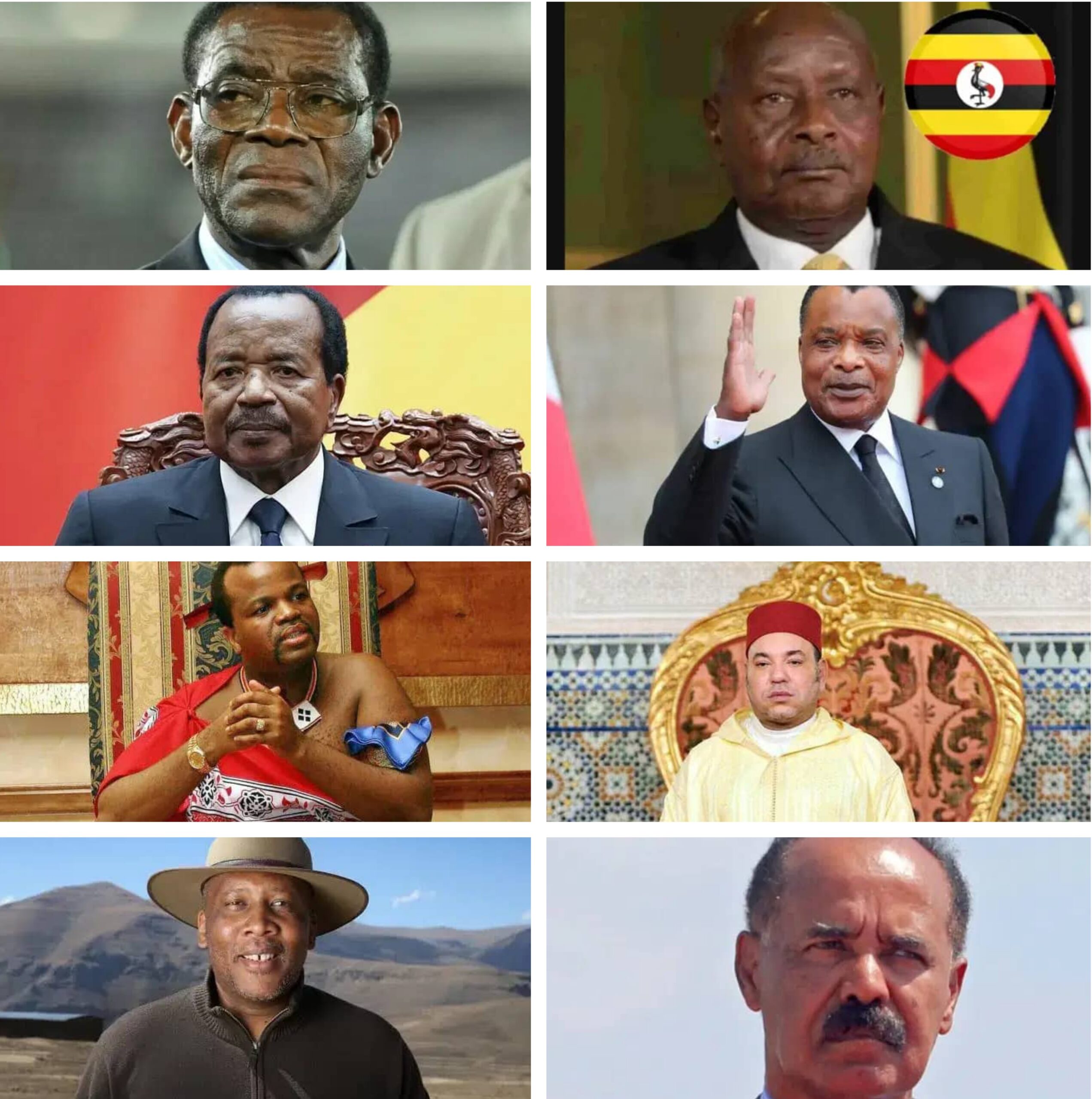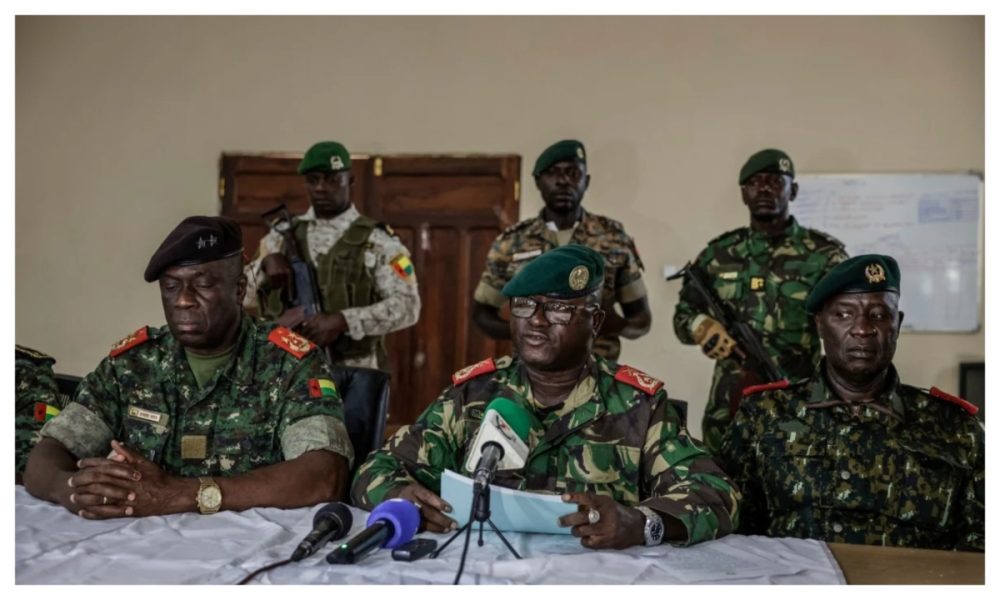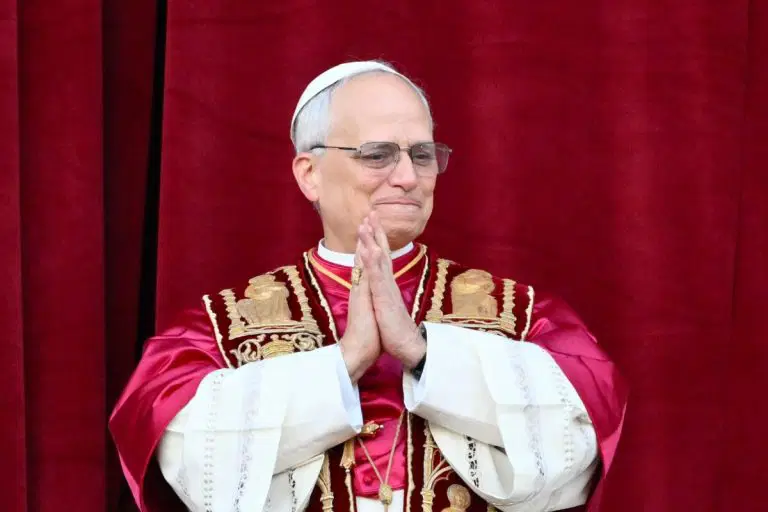Headline
Top 10 Longest-serving Presidents In Africa[PHOTOS]

Africa has seen several presidents who have remained in power for extended periods.
These long-serving presidents often maintain their positions through a mix of constitutional amendments, electoral manipulation, and suppression of political opposition.
Below are the top 10 longest-serving presidents and monarchs in Africa as of 2024.
1. Teodoro Obiang (45 years)

Teodoro Obiang Nguema Mbasogo, the President of Equatorial Guinea, holds the record as the longest-serving president in Africa and globally. He has been in power since August 1979, after a military coup that deposed his uncle, Francisco Macías Nguema. Obiang’s tenure has been marked by accusations of human rights abuses and corruption.
2. Paul Biya (42 years)

Paul Biya has been the President of Cameroon since November 6, 1982. As the second-longest-ruling president in Africa, Biya’s administration is heavily supported by France, which has provided military aid and training. His tenure has faced criticism over electoral fraud and governance issues.
READ ALSO: Gabon: Seven Longest Serving Presidents In Africa
3. Denis Sassou Nguesso (40 years)

Denis Sassou Nguesso of the Republic of the Congo has served as president for a total of 39 years, although not consecutively. His first term was from 1979 to 1992, and he returned to power in 1997 following a civil war. Nguesso’s long rule is characterized by allegations of corruption and authoritarianism.
4. Yoweri Museveni (38 years)

Yoweri Museveni has been the President of Uganda since January 1986, making him the fourth-longest-serving president in Africa. Museveni rose to power after a successful military campaign against previous regimes. His leadership has been criticized for alleged election rigging and suppression of dissent.
5. King Mswati III (38 years)

King Mswati III of Eswatini (formerly Swaziland) ascended to the throne on April 25, 1986, at the age of 18. He is one of the world’s longest-reigning monarchs, co-ruling with his mother, Queen Mother Ntfombi Tfwala. His reign has been marked by ongoing debates over democratic reforms and human rights.
READ ALSO: Rwanda Heads To The Polls As Kagame Makes Fourth-term Bid
6. Isaias Afwerki (31 years)

Isaias Afwerki has been the President of Eritrea since its independence from Ethiopia in April 1993. His rule is noted for its long duration and the country’s lack of national elections, contributing to ongoing criticisms regarding human rights and governance.
7. Letsie III (28 years)

King Letsie III of Lesotho became monarch in October 1997, following the death of his father, Moshoeshoe II. As a constitutional monarch, his role is largely ceremonial, but he remains one of the longest-serving rulers in Africa.
READ ALSO: King Sunny Ade Pays Tribute To Late Friend, Onyeka Onwenu
8. Ismaïl Omar Guelleh (25 years)

Ismaïl Omar Guelleh has been President of Djibouti since 1999. He succeeded his uncle, Hassan Gouled Aptidon, who had ruled since the country’s independence. Guelleh has faced allegations of extending his presidency through questionable means and electoral practices.
9. Mohammed VI (25 years)

King Mohammed VI of Morocco began his reign on July 23, 1999, following the death of his father, King Hassan II. As one of the most influential Muslim leaders globally, Mohammed VI’s reign has focused on modernization efforts and economic reforms, though it has also faced criticisms.
10. Paul Kagame (24 years)

Paul Kagame has been the President of Rwanda since April 2000. Kagame, who had been the de facto leader since 1994, took office officially following the resignation of then-President Bizimungu. His administration is credited with economic growth and development, though it faces scrutiny over political freedoms and human rights.
Headline
Coup: Guinea-Bissau Junta Releases Six Held Opposition Politicians

Guinea-Bissau’s ruling junta on Tuesday released six members of the political opposition who had been detained since a coup last month.
The six freed opposition members are said to be close associates of Domingos Simoes Pereira, head of the PAIGC party that led the country to independence in 1974.
Pereira has been in custody since the coup.
In a statement by the High Military Command, the junta’s governing body, the releases are described as a sign of good faith and a step towards the return to constitutional normality and respect for international rights.
READ ALSO:Why West African Troops Overturned Benin’s Coup But Watched Others Pass
The army seized power on 26 November after ousting outgoing President Umaro Sissoco Embalo in the wake of a presidential vote.
After taking over, the military suspended the electoral process and announced it would take control of the West African country for a period of one year.
Recall that another opposition candidate, Fernando Dias, took refuge in Nigeria’s embassy, which granted him asylum, while Embalo fled the country after being briefly detained by the military at the time of the coup.
Meanwhile, Senegal’s Foreign Minister, Cheikh Niang, led a delegation to Guinea-Bissau, where he met with detained opponents and requested their release.
Headline
7 Territories Still Under Colonial Rule

Even though most nations became independent in the last century, some territories are still ruled by other nations.
Contents
1. Western Sahara
2. Guam
3. American Samoa
4. United States Virgin Islands
5. Falkland Islands / Malvinas
6. Gibraltar
7. Bermuda
Many of them remain on the United Nations list of non-self-governing territories, meaning they have not completed the process of decolonization. These places usually depend on bigger countries for laws, passports, defence, or political control.
In this article, Nigerian Tribune highlights 7 territories still under colonial rule:
READ ALSO:Nigeria Ranks World’s 102nd Happiest Nation, US, Germany Not Among 20 Top Counties
1. Western Sahara
Western Sahara remains one of the world’s biggest unresolved colonial issues. Morocco controls most of the territory, but the Polisario Front wants independence for the Sahrawi people. The UN is still trying to help both sides agree on a peaceful solution.
2. Guam
Guam is an important US territory in the Pacific, used heavily for American military operations. The US oversees its defence and foreign relations.
People living there are US citizens, but they cannot vote in presidential elections and do not have full representation in Congress.
READ ALSO:FULL LIST: US To Review Green Cards From 19 ‘Countries Of Concern’ After Washington Shooting
3. American Samoa
American Samoa has more local control than Guam, but the United States still decides immigration, defence, and foreign affairs.
Residents are considered US nationals and must apply if they want full citizenship.
4. United States Virgin Islands
The US Virgin Islands have their own legislature, but the United States makes major constitutional and political decisions. The territory depends heavily on US federal support.
5. Falkland Islands / Malvinas
The Falkland Islands remain controlled by the United Kingdom (UK), but Argentina has long disputed this claim, having been in control of the Islands for a few years before 1833.
The people living there voted strongly to stay British, yet the sovereignty dispute continues to appear in the UN.
READ ALSO:Six Countries With Highest Number Of Billionaires In 2025
6. Gibraltar
Gibraltar sits at the Southern tip of Spain. The United Kingdom controls it, but Spain insists the territory belongs to them.
Gibraltarians have repeatedly voted in favour of remaining British, but the dispute is still discussed within the UN Decolonisation Committee.
7. Bermuda
Bermuda is a British Overseas Territory situated in the North Atlantic Ocean. Although it manages most of its own internal affairs and enjoys a strong economy with modern facilities, the United Kingdom still handles its defence and represents it in global matters.
Headline
Russia-Ukraine War: Pope Leo Calls For Global Christmas Truce

Pope Leo XIV on Tuesday renewed his call for a global truce on Christmas Day, saying he felt “great sadness” after Russia “apparently rejected a request” for a pause in fighting.
Speaking to reporters at his residence in Castel Gandolfo near Rome, the Pope urged all sides involved in conflict to observe at least one day of peace.
“I am renewing my request to all people of goodwill to respect a day of peace — at least on the feast of the birth of our Saviour,” Leo said.
Recall that Russia invaded Ukraine in February 2022 and has repeatedly turned down calls for a ceasefire, arguing that any pause would give Ukraine a military advantage.
READ ALSO:Russian Strikes Kill Five In Ukraine, Cause Power Outages
“Among the things that cause me great sadness is the fact that Russia has apparently rejected a request for a truce,” the pope said.
Referring to conflicts worldwide, Leo added, “I hope they will listen and there will be 24 hours of peace in the whole world.”
The appeal came as fighting continued in eastern Ukraine. On Tuesday, Ukrainian forces withdrew from a town after heavy battles with Russian troops. Russian strikes killed three civilians and left thousands without power during winter temperatures.
READ ALSO:Trump Blasts Ukraine For ‘Zero Gratitude’ Amid Talks To Halt War
There was no indication of progress toward ending the war after separate meetings last weekend in Miami between the United States officials and negotiators from Russia and Ukraine. The conflict is nearing four years with no settlement in sight.
Earlier this month, Pope Leo met Ukrainian President Volodymyr Zelensky. When asked whether he would accept Zelensky’s invitation to visit Ukraine, the pope said, “I hope so,” while noting that it was not possible to say when such a visit could happen.
Leo also warned that efforts to secure peace without European diplomatic involvement were “unrealistic”, expressing optimism that President Donald Trump’s proposed peace plan could bring a “huge change” to the transatlantic alliance.

 News3 days ago
News3 days agoPHOTOS: New Era In Furupagha-Ebijaw As Okpururu 1 Receives Staff Of Office

 News2 days ago
News2 days agoUBTH CMD Marks 120 Days In Office, Expresses Commitment To Providing Conducive Working Environment

 News3 days ago
News3 days agoFG Declares Public Holidays For Christmas, New Year Celebrations

 News3 days ago
News3 days agoOPINION: Gumi And His Terrorists

 News2 days ago
News2 days agoFIRS Confirms NIN As Tax ID

 News2 days ago
News2 days agoOPINION: My Man Of The Season

 Metro2 days ago
Metro2 days agoFintiri Pardons Man Sentenced To Death For ‘Killing Herdsman In Self-defence’, Others

 News3 days ago
News3 days agoOPINION: Christmas And A Motherless Child

 News2 days ago
News2 days agoKWAM 1 Withdraws From Awujale Race, Ends Court Challenge

 Metro2 days ago
Metro2 days agoPetrol Tanker Crashes Into Akpabio’s Convoy, Kills Police Dispatch Rider






























